“I can sentence you to walk the Earth in an agony of loneliness for the rest of time.”
“The Reverend Trask, I presume!” says Nicholas Blair, to the skeleton chained up in the cellar of the Old House. “Where is Cassandra? What have you done with her?”
Nicholas just arrived on Dark Shadows yesterday, and he’s been strutting around like he owns the place, and by “the place”, I mean the planet Earth. It’s not clear what he is, exactly, but he’s introduced himself as the brother of Cassandra, the Collins family’s personal nightmare. She was cast into darkness recently by the spirit of an 18th-century witch hunter, and now her dear brother has come to her rescue.
Nicholas raises his arms, and makes malevolent hand gestures towards the skeleton. “I command you to come back!” he cries. “Back from the grave… Appear before me in this room as you really are! NOW, Reverend!”
So that’s what we know about Nicholas, so far. He’s a dude that threatens skeletons.
And it works, obviously, because what fun would it be if it didn’t? Reverend Trask appears, as requested, and he doesn’t look happy about it.
“Who are you?” the Reverend demands.
Nicholas regards Trask with a casual insouciance. “The one who has commanded you,” he smiles, “the one you will obey. Surely you must know by this time, Reverend, that there is no rest for the wicked.”
Stung, Trask declares, “I am a man of God!”
Nicholas just laughs. “Oh, a man of God indeed,” he smiles. “In your time, you were the greatest of all possible fools.”
“You were a blind, overzealous fanatic,” Nicholas says. “A bigot and a fraud — intolerant, cruel and unjust. A man after my own heart.”
Let’s pause there for a just a second, and wonder what that could possibly mean. If Dark Shadows in the summer of ’68 is anything other than a piping hot mess, it’s an examination of the nature of Evil, as a spiritual force.
So far, we’ve seen characters doing things that are evil with a small e, in order to achieve some personal, selfish goal. Jason blackmailed Elizabeth, and tried to get control of her fortune. Barnabas kidnapped and tortured Maggie. Angelique manipulated and slaughtered Barnabas’ family, to lure him into marrying her. Julia helped Barnabas murder her friend, Dr. Woodard, in order to stop him from exposing her crimes.
But this is the first time we’ve seen someone express an interest in Evil with a capital E, and it’s kind of a baffling idea.
You can imagine someone being happy about doing “good works” like feeding the hungry and curing the sick, because they have a general interest in making the world a better place. There’s an understandable duality between being selfish, and being selfless. Working for the benefit of others is good; honoring your own vanity and greed to the detriment of others is not.
When you try to flip that around, as Nicholas is doing here, the concept kind of falls apart. Why would you enjoy seeing people be cruel and intolerant, as a general principle? What self-centered goal would that advance?
But I suppose I shouldn’t expect the spooky haunted-house show to be philosophically consistent. Watching Nicholas bait Trask is just good, clean fun.
Trask: I know who you are! You are the Devil himself, come to tempt me!
Nicholas: How you do flatter yourself, Mr. Trask.
Trask: Even if you are not the Devil, you are surely in league with him! But I will not be tempted! I will not listen to you!
Nicholas: You have no choice.
Trask: I can return to my grave!
Nicholas: When I say so, and not before.
Trask: No! I spent my life resisting Satan!
Nicholas: You only thought you did.
Trask: I served only the Almighty!
Nicholas: Oh! What a poor, deluded creature you must have been.
Furious, Reverend Trask strikes a pose.
Trask: I command thee, begone! Cast thyself back into Hell, from whence thee came! BEGONE!
The music swells to a dramatic crescendo…
… and then cuts out.
Nicholas gives Trask a round of applause. “Very impressive,” he says, “but as you can see, totally ineffective.”
It’s a great moment, and the joke depends on the sarcastic use of the music cue. Even the soundtrack is on Nicholas’ side. We all are.
So here’s a television show that’s recently decided that it’s aimed at teenagers, which is demonstrating very clearly that the forces of evil are way cooler than church people.
This is a point of view that would be absolutely impossible to advance on daytime television today, because right-wing Christianity has basically put a stop to all of this nonsense.
The Christian right is so dominant in American culture by now that it’s easy to forget that there was ever a time before. This is especially true because they talk so much about traditional values, implying that the point of view that they advocate for has always been the dominant perspective in America.
In fact, the Christian right began in the mid-1970s, initially as a reaction to the controversies around Bob Jones University, a Christian college in South Carolina with a hard-line policy against interracial dating. For a particular segment of evangelical Christianity, ending racial segregation wasn’t just a civil rights issue; they saw it as an attack on Christian values.
Bob Jones III, then the president of Bob Jones University, explained in 1982 that “the Bible clearly states, starting in the 10th chapter of Genesis and going all the way through, that God has put differences among people on the earth to keep the earth divided.” If the races intermarry, the theory goes, then that would pave the way for the creation of a “one-world system,” ruled by the Antichrist.
The university, which was founded in 1927, didn’t allow black students to enroll until 1971, when the Supreme Court ruled that private schools that practiced racial discrimination would not be allowed to hold 501 (c)(3) tax-exempt status as non-profit organizations. In 1971, Bob Jones University began to admit black students, but only if they were married, so that there would be limited opportunities for black and white students to date. They eventually allowed single black students to attend starting in 1975, although they continued to deny admission to students who were involved in an interracial marriage, or who were “known to advocate interracial marriage or dating.” (This policy remained in place until 2000, and it was only in 2008 that the university officially apologized.)
That was the moment, in the mid-1970s, when the social progress of the previous decade collided with the grassroots organizing power of the religious right. Socially conservative evangelicals saw the criticism of Bob Jones University’s racist policies as an attack on religious liberty. They started political advocacy groups — Christian Voice in 1978, the Moral Majority in 1980, and the Christian Coalition in 1989 — which essentially redefined the Republican Party’s social-issues platform.
Forty years later, the Christian right has moved away from defending racial discrimination, and developed a list of hot-button issues that can drive the faithful to the voting booths and letter-writing campaigns, including opposition to abortion, the Equal Rights Amendment, gay marriage and other civil rights for LGBT people, advocacy for teaching creationism, prayer in public schools, and abstinence-based sexuality education.

In the 1980s, the Moral Majority was especially critical of TV shows and movies that the group felt promoted an “anti-family” agenda, particularly when it came to negative portrayals of Christians, and positive portrayals of single mothers, and gay and transgendered people.
One way to track the influence that the Christian right has had on American television is to look at when gay and lesbian characters were allowed to kiss each other on camera. In 1991, it was a really big deal when two lesbian characters kissed on L.A. Law. A well-publicized prime-time kiss between two guys almost happened on Melrose Place in 1994, but Christian groups threatened to boycott advertisers, and FOX insisted that the camera cut away from the couple before the kiss, to show the surprised reaction of a straight friend who sees them. It wasn’t until 2001 that a network aired the first romantic kiss between two guys, on Dawson’s Creek.
On daytime TV, the first romantic kiss between lesbians was in 2003, when Bianca kissed Lena on All My Children, and for guys, it was Luke and Noah on As the World Turns in 2007.
So it’s almost impossible for us now to even imagine what it was like in 1968, when a daytime TV show with a huge teenage following could broadcast a long-form critique of Christian fundamentalism during the summer break.
On current TV, the closest analogue that comes to mind is True Blood, a night-time show on premium cable. I can’t think of any prime-time network show that would make the Devil look more appealing than a ranting, angry hellfire-and-brimstone preacher. I suppose it’s possible that American Horror Story might get around to it at some point.
But in the crazy summer of 1968, this is acceptable children’s television, because nobody’s figured out how to organize against it yet. It’s certainly unusual to introduce a charming, suave agent of Satan on afternoon TV, but apparently it’s possible to get away with it. In fact, by Thanksgiving, Nicholas is going to perform a Black Mass on camera, and the show’s ratings will continue to rise, unimpeded by boycotts and outcries. I wonder what they’ll think of next.
Tomorrow: Dead Man Walking.
Dark Shadows bloopers to watch out for:
In the teaser, when Nicholas says, “The Reverend Trask, I presume!” somebody bumps into the camera, and it shakes a little.
In act 2, Nicholas says to Vicki, “If you’ll excuse me, Miss Wunters — uh, Winters — I must be on my way.”
In act 3, just after Jeff’s entrance, Vicki coughs during one of his lines.
There’s another Chromakey flub at the end of the episode, when Trask appears in the Collinwood drawing room. The camera shooting Vicki and Jeff moves, making it look like the apparition glides gently to the left for a moment.
Behind the Scenes:
Sadly, this is the last time we’ll see Reverend Trask on Dark Shadows. We’ll see other Trasks over the course of the show, most notably Gregory Trask in the 1897 storyline.
A note from resident prop-spotter Prisoner of the Night: In Tony’s apartment, the tall green lamp that was beside the sofa two weeks ago has been replaced by a tall yellow lamp, previously seen in Carolyn’s room in episode 506.
Tomorrow: Dead Man Walking.
— Danny Horn


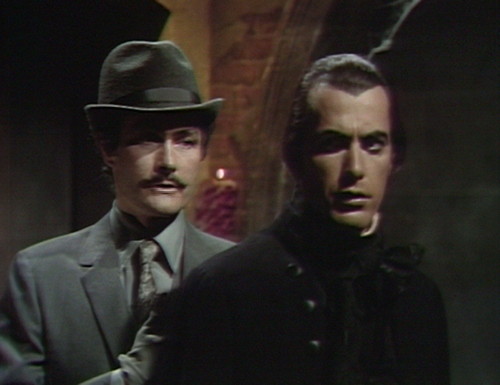
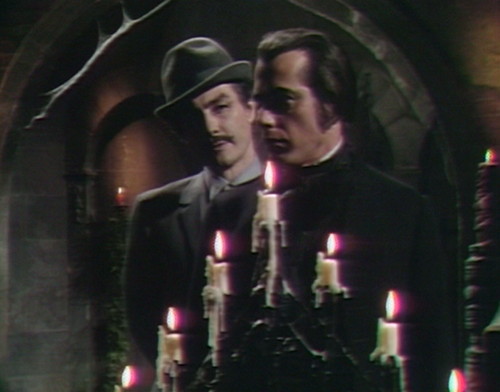

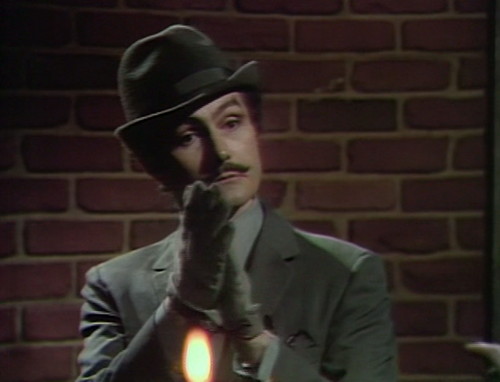
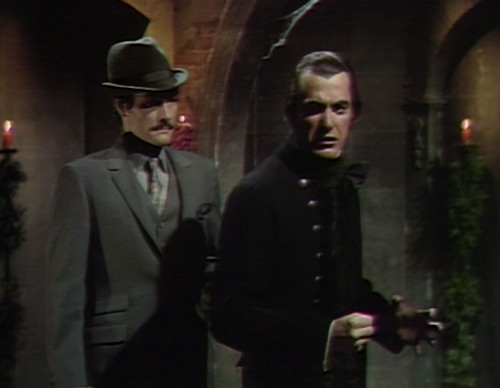
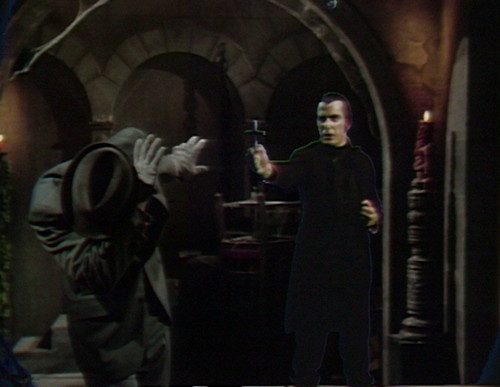

I always thought Rev Trask was the best out of all of them. Jerry Lacy was awesome in this roll.
I guess that after dealing with the likes of Jerry Falwell, Pat Robertson, the Tea Party et. al., we are far more indulgent with Barnabas’ bricking up of Trask….
Im in full agreememt…i used Trask in comparison to todays self righteous frauds of the so called religious right.
Absolutely!!!
Thats a shame this is their only scene together. These two should have had a storyline together. Why do they take a good character like Reverand Trask away and stick us with Adam?
I agree.
Victoria Wunters has a nice ring to it.
At the time, I heard that fundamentalist Christians had these little comic book tract pamphlets they would hand out to people that was anti-Dark Shadows (again due to all the witchcraft/Devil stuff), and that they used the same tract (just changing a few words) to be anti-Bewitched, the cute fluffy sitcom about Samantha and Darren. OK, in the first season, Samantha did make a sarcastic reference to housewives in Morning Glory Circle going around worshiping Beelzebub (this was in the episode where I think where Darren suspected one of Sam’s friends of being a witch [she wasn’t] and trying to prevent a young Adam West [pre-Batman] from going out with her. [Adam West just happened to work at McMann & Tate as a graphic designer.] Anyhow, these fundamentalist tracts always ended with a plug for sinners to be saved. Ironic thing about this episode, Trask does seem to have some sort of power, maybe by invoking the “Almighty,” despite being both ruthless and unscrupulous in life, but here Nicholas seems to hint that Trask is serving Satan… of course, it’s always interesting to see anyone being a foil for Angelique, certainly makes her more interesting to say the least.
There goes grabby Roger Davis again. Did you notice that when Vicki answers the door and it’s Jeff, they hug, and Jeff does so with his hands all over her so much that he pulls up the back of her dress somewhat indelicately?
The chromakey effect in which Trask materializes over his skeleton was nice move. They even masked Trask’s image to match the pattern of the partially-removed bricks. Unfortunately, it didn’t quite line up with the bricks in the live shot. You can see this mismatch in the still photo at the end of today’s blog.
Headcanon: Moltke’s cough in act 3 is Vicki choking on Jeff’s cologne.
It would have been even better if they had chromakeyed Blair, but had him stay exactly where he was, to show that he had control over the show’s special effects too.
In order of importance, I believe that Alexandra might have actually sneezed rather than coughed behind Roger’s back. Makes me wonder how often actors work while sick. (I recently read that Susan Sarandon caught pneumonia while making “The Rocky Horror Picture Show” but trouped on nevertheless.)
Did anyone else notice that Nicholas Blair, who BTW wears an actual hat, wears it indoors while visiting the old house? When he returns to Collinwood, he takes it off. What does that mean? That he doesn’t remove his hat when he doesn’t intend to stay? That he has no respect for the old house as if it were a decommissioned church where the actual living rarely if ever dwell? (Barnabas, Willie and Adam are all “living” with an asterisk – recently former vampire, recovering vampire’s slave, and corpse-monster.) Maybe he doesn’t want to be seen deviating from custom in the new house where the living gather in numbers. He might seem fearless and indomitable, but he also wants to minimize suspicion and opposition.
A word in favor of Alexandra Moltke: What is the one thing she has in common with Humbert Allen Astredo? Just one thing. They both know their lines.
As to today’s sermon on the Christian right, I think it is off kilter as well as off topic. Bob Jones University is not representative of most conservative Christians-who-happen-to-be-white, to whom racism, once both rampant and unexamined, never belonged exclusively. Race has not been and is not an issue for them as much as they continue to be bludgeoned with it as if it were their only issue. Can we say straw man?
Just after Dark Shadows first went on the air, conservative Christians in America burned Beatles’ albums because John Lennon had said that the Beatles were more popular than Jesus (and also people were curious to see how vinyl burns). Today the Beatles are virtually sainted, and that protest, when remembered at all, seems a bit of an over-reaction. But the conservative social attitudes taken for granted during the 1950s were breaking down in the 1960s. Church attendance was down, kids were listening to rock’n’roll, there were protests against war (and whatever else you got), people were taking drugs, having sex out of wedlock, and doing all manner of heretofore forbidden things. Pace Danny, the conservative movement since the 1960s has been a rear-guard action with ups and downs in its trajectory, but it has never regained the hegemony over popular culture that it once had.
The reason why Nicholas Blair could be manifestly anti-Christian on Dark Shadows in 1968 was due partly to eroding traditional values, but also to the fact that he was expected to run-down traditional values because –hello! – he’s Evil with a capital “E” (even if delightfully so), and finally because the suits at ABC were still not watching this show.
I’m sad to read that this is Reverend Trask’s last episode. Even more sad that Jeff and his yelling are back…ugh! Nicholas Blair is very mysterious and interesting so it’ll be good to see how his story unfolds.
As TD mentions above, Roger Davis’s hands are all over the place in his scene with Vicky. The kiss seemed particularly aggressive and I thought I sensed AM trying to push him away but maybe I was imagining things. I suppose there’s no chance they’ll stuff Davis behind a brick wall but it’s an appealing thought nonetheless.
We don’t have end credits on this episode. Is Gordon Russell misidentified as the writer of this episode? Russell is one of DS’s stronger writers, but the cleverness of the dialogue throughout the episode seems more Sam Hall-ish to me (and he wrote the previous episode).